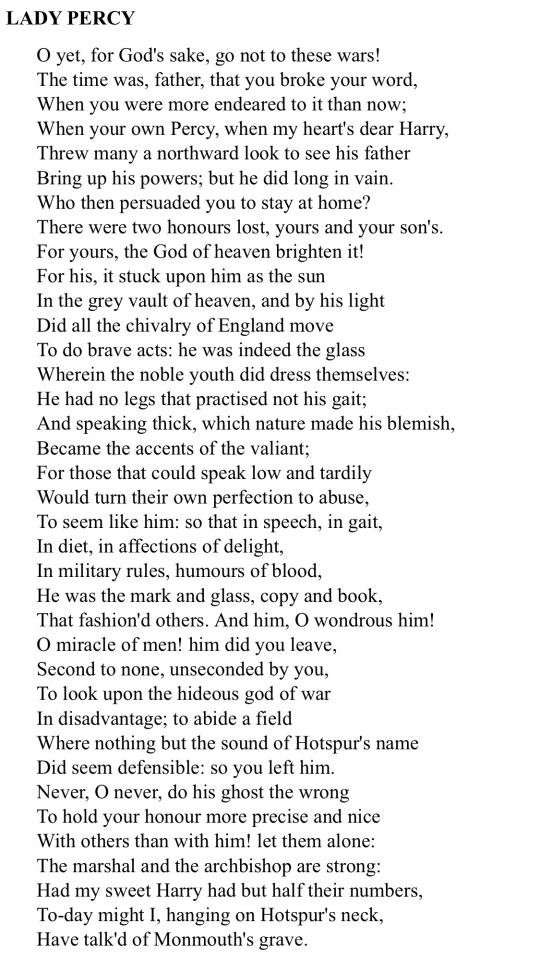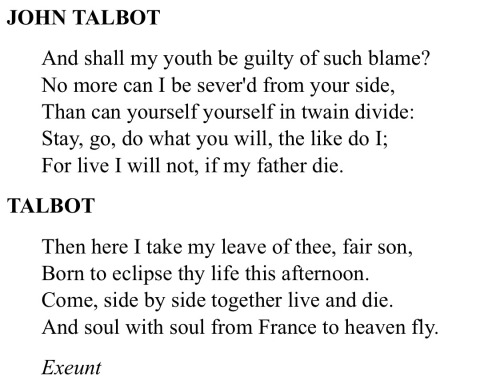Mamma mia here we go again…
Henry IV Part 2
★★☆☆☆
my roles: Lady Percy, Francis, Bardolph, Prince John, Servant, Harcourt, Porter, Simon Shadow, Second Groom
I have made no secret of the fact that I kind of hate the Henriad – sorry @ all of Shakespeare scholarship but Henry IV Part 2 is hands down my least favorite play of the 31 that I’ve read so far. The thing about this play is that I just don’t care – I know that’s on me and that it’s not an objective criticism in any way, but it is what it is. I think Hal is a tremendously well-written character whose arc is decently compelling (and those scenes with Henry IV at the end of this play are god-tier as far as emotional devastation goes, which isn’t even to mention Henry IV’s final lines – sob), but that just isn’t enough to really earn my investment in this nearly 3-hour long affair. And as I mentioned in my review of Henry IV Part 1, I find Falstaff insufferable and the comedic subplots in these two plays are frankly painful to slog through.
ALL THAT SAID I haven’t even mentioned the LIGHT OF MY LIFE, Kate Percy. She only appears in one scene in this play and still she delivers what has to be in my top 10 Shakespeare monologues, roasting Northumberland for letting his son Hotspur die in battle 1H4 at the hands of Hal (Monmouth) without sending backup:
MIC DROP. I ADORE HER.
Anyway, this wasn’t my favorite Project Shakespeare simply because it’s so Falstaff-heavy (though our Falstaff was brilliant so plenty of credit where it’s due to her) and because I was really failing to follow along with the story even though I’d already read it (I don’t think ANYONE was following along with the story that night, idek), but the individual performances were really shining! Oh and I had something like 16 costume changes and my bangs were a complete mess by the end of the night from swapping John’s crown with Bardolph’s baseball cap.
The Merry Wives of Windsor
★★★★☆
my roles: Caius, Pistol, Anne Page, Servant, First Servant, Second Servant
Yes, I know, I just said that I can’t stand Falstaff – no one is more surprised than I am that I didn’t hate Merry Wives. And actually, far from it – it’s probably one of my favorite comedies. It helps that even though Falstaff is the protagonist he is very much the butt of the joke, and it’s lively and refreshing and downright charming to watch all these clever women playing tricks on him. This one was very, very fun to perform.
Coriolanus
★★★★☆
my roles: Menenius, First Roman, Citizen, Seventh Citizen, Third Lord
I might change my rating of this one to 3 stars… I don’t know. I firmly believe that Coriolanus is the single most frustrating Shakespeare play. This play has greatness within its grasp and it is so close to achieving it but it just misses the target. The conflict it sets up is brilliant but it takes an agonizingly long time to get there (I have yet to find a single compelling reason why acts 1-3 can’t be condensed), the play never justifies its length, and the titular character’s lack of interiority can make the reader/viewer feel as though they’re running up against a brick wall. What I do adore about this play though is the dynamic between Coriolanus and Aufidius which I think is one of the most fascinating things Shakespeare ever wrote (I mean… this monologue…..!!) I don’t know – on the one hand this play just has this je ne sais quoi that hooks me and on the other I find it dull and tedious.
Anyway, when I read this play and subsequently watched two different productions Menenius didn’t make much of an impression on me despite his 500+ lines, but I unexpectedly loved playing him, so this was a lot of fun.
Henry VI Part 1
★★★★☆
my roles: Suffolk, Vernon, Bastard of Orleans, Third Servingman, First Warder, Porter, Scout
As my unconventional taste in the histories continues to thrive, I loved the first installment of the Henry VI saga. This play arguably suffers from a lack of a central, cogent narrative conflict (while England v. France is obviously that conflict in a broader sense, it’s rather sweeping in scope), but for whatever reason I find all the mini-conflicts to be equally fascinating, and I thought this play was incredibly entertaining from start to finish. Also, the two back to back scenes where Talbot urges his son to flee when he knows he’s at the brink of death but his son refuses to leave his side are legitimately DEVASTATING. I mean:
It’s just one small moment in the play but I also think it effectively captures the tragedy of war better than anything.
I also loved playing Suffolk and I think his scene with Margaret is just delightful and utterly absurd and I cannot wait to see her character development over the next two (well, three) plays.
Next up – Two Noble Kinsmen which will surely be a delight. Stay tuned to hear about that in four more weeks.





























